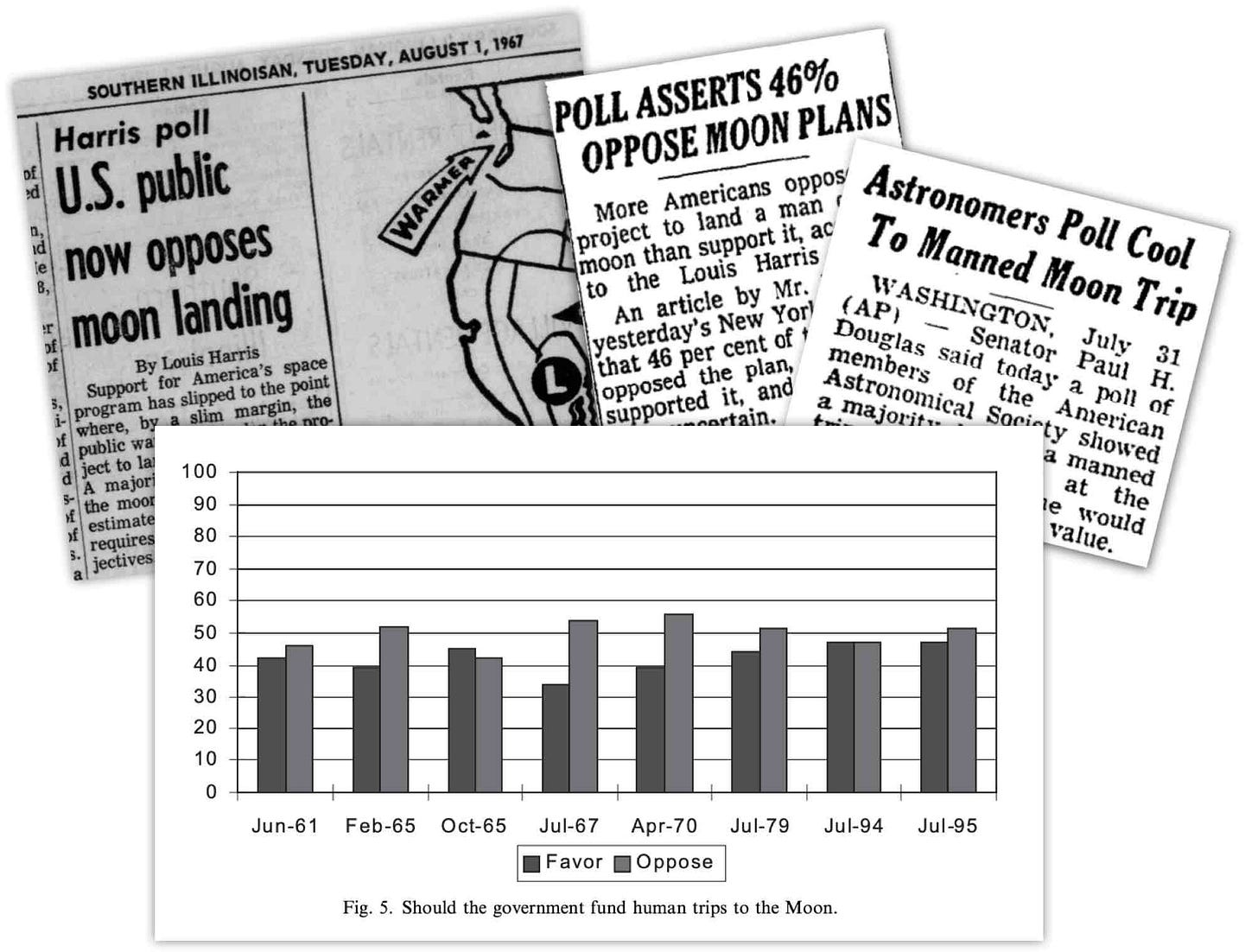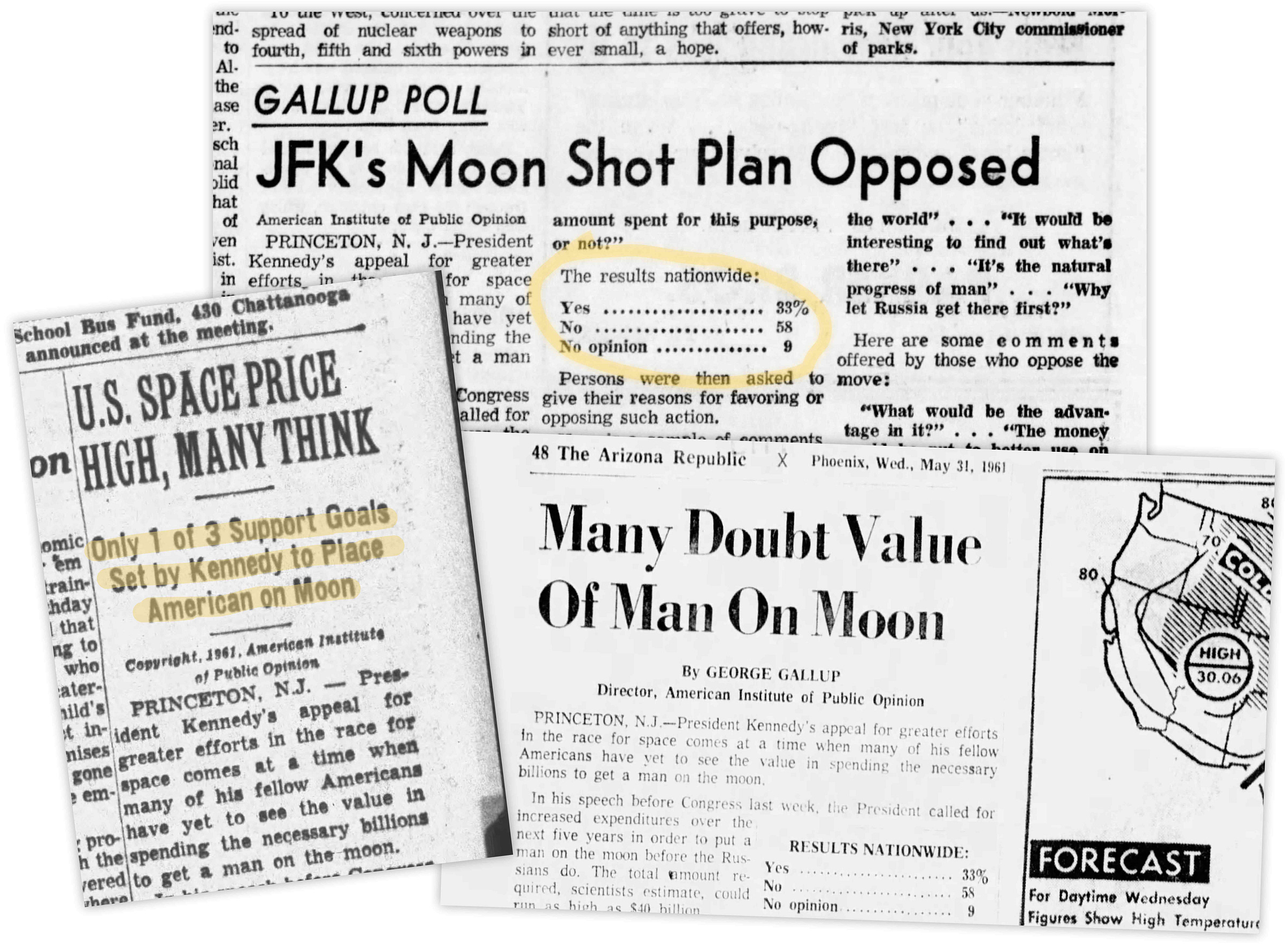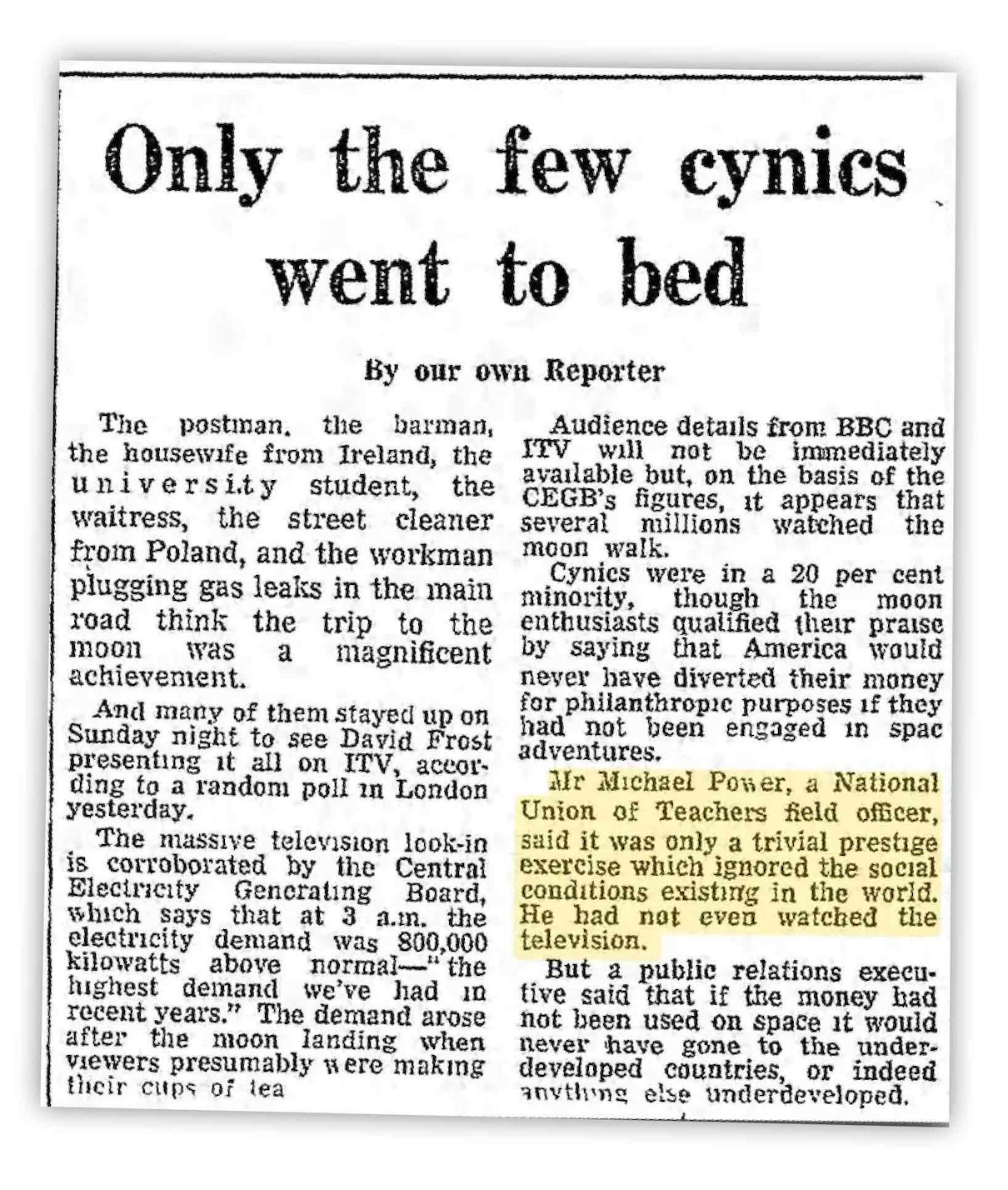The Moon Landing was Opposed by Majority of US
In 1961 a Gallup poll showed only 33% of Americans in favor of moon landing
AN UPDATED VERSION OF THIS POST CAN BE FOUND HERE:
July 20th, 2025 marks the 56th anniversary of the moon landing.
In retrospect the feat is viewed with pride and reverence in the United States, a symbol of American exceptionalism. However, before that giant leap for mankind - Americans weren’t so excited: in 1961 a Gallup poll showed only 33% of America in favor of a moon mission.
Aggregations of opinion polls in the 1960s have shown approval of the moon landing was consistently lower than disapproval. One poll of astronomers showed a majority against the mission. Even President Kennedy’s own head of Science Advisory Committee - Jerome Wiesner - opposed a manned mission, releasing a critical report on the notion.

MEMORY BLACK HOLE
Popular opposition isn’t something you often hear about regarding the Apollo program. It is conveniently missing from America’s collective memory, in lieu of a tale of collective patriotic triumph. A narrative that pleases Democrats as an example of successful big public programs - and Republicans - as a triumph of the capitalist west against the communist east.
The retroactive support now, is as bi-partisan as the opposition was then.
In 1963 noted fiscal hawk Barry Goldwater dismissed the lofty ambitions of lunar exploration as a "wasteful endeavor" at a $1000-a-plate fundraise no-less. The same year, he warned the United States was "moon struck" and if it “fixes upon it, we could lose the earth or be buried in it.” (President Kennedy’s initial suggestion of teaming up with Russia to reach the moon drew opposition from Republican’s too, for obvious reasons.)
Former President Dwight D. Eisenhower - whose administration initially created and funded NASA - expressed his own reservations, dismissing Kennedy's lunar ambition as "almost hysterical" saying:
“Anybody who would spend $40 billion in a race to the moon for national prestige is nuts…”
Republican’s adopted the term ‘Moondoggle’ - coined in 1961 by AI pioneer (and original AI doomer) Dr. Norbert Wiener. In 1964 a book criticizing the endeavor would be released borrowing the term for its title. More progressive and leftwing opposition revolved around the desire for more spending on the needs of citizens, most famously encapsulated by Gil Scott-Heron’s spoken word poem ‘Whitey on the Moon.’ (released a year after the moon landing)
In 1962 The New York Times would note what else such a budget could afford the American people: over a hundred universities, millions of homes, hundreds of hospitals and cancer research:
It has since emerged (in 2011) that even President Kennedy himself would express doubts about the projects cost and popularity saying “We’re talking about these fantastic expenditures which wreck our budget, and all these other domestic programs are starving to death.” saying
As author of ‘One Giant Leap’ Charles Fishman notes when the landing eventually happened The New York Times would devote 18-pages to the moon walk. Amusingly the same paper deemed space travel impossible in 1920, issuing a correction as Apollo 11 approached the moon:
In 1963 the newly appointed editor of the prestigious journal ‘Science’ - Philip Abelson - would pen a critique of the mission - saying it was a moral outrage to focus research expenditure on something like Cancer research. He would appear on The Today Show that same year to argue the point. The Washington Post would cover Abelson’s criticisms, followed by a 3-part series in the same spirit titled ‘Moon Madness.’
AFTERMATH
In the aftermath of the moon landing, approval for that specific mission didn’t meaningfully budge. Although it did captures people’s imaginations - including detractor Barry Goldwater, who called the Apollo crew “the only national heroes we have” crediting them with “giving inspiration and hope to the young people of our country.”
47% said it was worth it a decade later, in 1979 and it would take 20 years for amnesia to set it and this number to reach 77% in 1989. Meanwhile opposition to further moon missions remained higher than support for one until at least the mid-1990s. The US hasn’t been back to the moon since 1972.
Some posit this is because we lack the political will for big public projects we had in the 1960s, but it seems clear we haven’t been back to the lunar surface because we never wanted to go in the first place. The lack of ambition by NASA since is one of the things that prompted some of America’s wealthiest to move space exploration into the realms of private sector, such as Jeff Bezos and Elon Musk.
This time around, fiscal conservatives are less opposed, since private efficiencies like re-usable rockets have lowered the tax burden of space exploration. Left wing critics like Bernie Sanders complain - in outlets like The Guardian - that those private dollars invested in space ought to have been taxed away to fund public programs like Apollo - ignoring the fact those kind of programs have always been politically unpopular. (Sanders would have likely made the same arguments about Apollo had he been a Senator in the 1960s.)
Ironically in July 1969, that same outlet in which Sanders wrote - The Guardian - called a teachers’ union officer a “cynic” for calling America’s moonshot “A trivial prestige exercise” that “ignored the social conditions existing in the world”, reporting that when man first set foot on the moon, he had not even been watching it on TV.
Last year NASA awarded Jeff Bezos’s space company Blue Origin a contract to bring humans back to the lunar surface once again.








I guess this is the part where consequentialism comes into play. For the amount of money and resources put into the moon landing then, what tangible benefits have come out of it today?
In my opinion, the 1969 Moon landing was an event that was supposed to occur in the 21st Century, not the 20th. The was clawed into the 20th Century only though the full industrial and scientific might of the United States.
That is also why it wasn't a sustainable endeavor. This time around, with China and the US returning to the Moon, what matters is this time is who can acheive a sustainable presence.